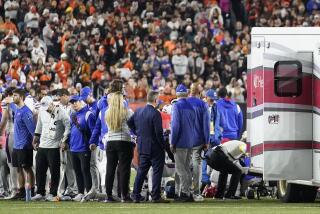Helm’s Death Blamed on Stress Infection Put on Heart
- Share via
OAKLAND — Longshoreman Buck Helm, who lived for more than a month after being trapped for days amid the collapsed Nimitz Freeway, probably died from widespread infection and the stress it placed on an already diseased heart, his doctor said Monday.
Helm’s death Saturday shocked the medical staff because he appeared to be improving last week, said Dr. Tom McDonald, chief of surgery at Oakland’s Kaiser Permanente Medical Center.
But Helm broke into a fever Thursday, suggesting that he had an infection. The possibly lethal infections could have been caused by a seat belt injury sustained when the freeway collapsed in the Oct. 17 earthquake. He spent nearly four days in the rubble trapped in his partially crushed auto.
“When he had this episode of sepsis (blood poisoning), which may have come from a small infection that was found in his abdomen, that seemed to be the event that caused his heart to stop beating,” McDonald said.
At a press conference, the doctor emphasized that Helm’s death came about because of the mass of injuries he suffered when the Nimitz Freeway fell and the 89 hours he spent entombed there.
“The heart had responded many times previously to events similar to this in a positive way,” McDonald said. “This time it didn’t. In that sense, his heart stopped, and that is the cause of death.
“But the true underlying cause of death was all the trauma that all of his organ systems had sustained.”
McDonald said that for the 28 days he was hospitalized, Helm “was never able to speak.” Doctors had inserted a respirator tube in his throat. Asked whether Helm had any recollection of the earthquake and what had happened to him, McDonald replied: “I don’t know.”
McDonald said Helm did seem to be able to communicate more with his ex-wife and children than with the hospital staff. But even that communication was limited to hand signals.
“He was enjoying the bits of entertainment he could receive such as listening to music,” McDonald said. “He appeared to on occasion watch television, and he seemed to be--as much as possible--energetically involved in his own recovery, when one understands all the limitations that he had.”
In addition to hiring a lawyer to consider suing over the freeway’s collapse, the Helm family retained a public relations firm to help sift through potential movie offers.
Christina Welsh of the Gary Frischer Organization publicity firm said she did not know how Helm’s death might affect movie possibilities. Referring to the family, she added: “Their feelings, their grief, that’s all anyone really wants to deal with now.
“We really haven’t dealt with that issue. That’s not really our concern right now.”
Helm’s ex-wife, Lorene, had been at his bedside until about 6:50 p.m. Saturday. McDonald said Lorene Helm did not notice any change in his condition. But within 10 minutes after she left, nurses in the intensive-care unit saw that he was gasping, and a monitor recording his heart rate dropped from 80 to 100 beats per minute to between 50 or 60 beats.
An alarm sounded, and a team of doctors and nurses tried to revive him, with “numbers of different drugs . . . and electroshock therapy,” McDonald said. But the man who had riveted the nation’s attention when he was miraculously rescued slipped into unconsciousness and was declared dead at 7:38 p.m.
McDonald, who had been at a convention of Kaiser doctors when Helm died, said Helm had been removed from a machine that had assisted his kidneys last week and would have been taken off a respirator by today.
“I was just so surprised because when I had seen him, I was optimistic that he was going to do well,” McDonald said, recalling his feeling upon hearing that his patient had died.
McDonald said Helm had a “hidden” medical problem: heart disease, including enlargement of part of his heart, and hardened coronary arteries.
“His heart had been handling major problem after major problem after major problem. And this event, his heart could not handle,” McDonald said.
An autopsy said the cause of death was “blunt trauma to head and torso, multiple medical complications including mechanical respiratory failure, renal (kidney) failure and recurrent sepsis due to intra-abdominal abscess.”
Helm, hailed as a symbol of hope and survival following the devastating quake, is the 42nd person to die from the freeway collapse and 67th death attributed to the earthquake.
His funeral is scheduled today in Weaverville. Helm spent weekends in the small Northern California town and traveled to his job as a clerk on the Oakland waterfront during the week.
More to Read
Sign up for Essential California
The most important California stories and recommendations in your inbox every morning.
You may occasionally receive promotional content from the Los Angeles Times.










